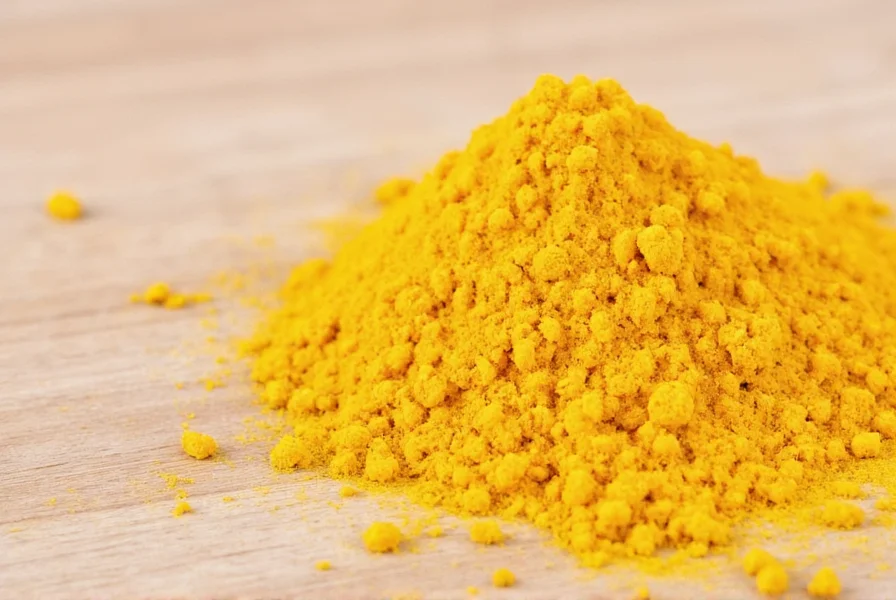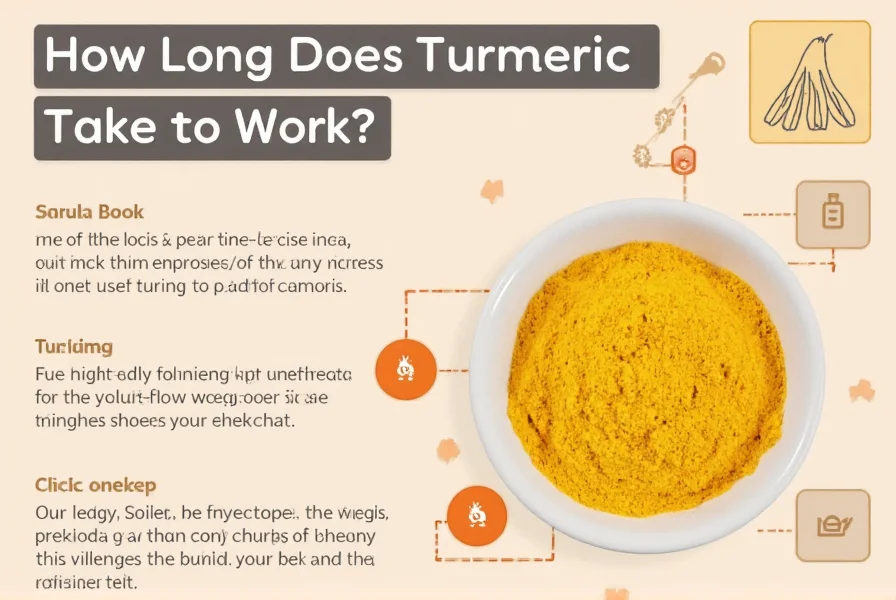Understanding how long turmeric takes to work requires examining both scientific evidence and practical application. Turmeric contains curcumin, its primary active compound responsible for most health benefits, but curcumin has notoriously low bioavailability. This means your body struggles to absorb and utilize it effectively without proper formulation.
Factors Influencing Turmeric's Effectiveness Timeline
Several critical variables determine how quickly you might experience benefits from turmeric:
| Factor | Impact on Timeline | Recommendation |
|---|---|---|
| Curcumin concentration | Standard turmeric contains only 3-5% curcumin; higher concentrations work faster | Choose supplements with 95% curcumin extract for therapeutic effects |
| Bioavailability enhancers | Without enhancers, 75-80% of curcumin passes through undigested | Look for formulations with piperine (black pepper extract) or phospholipids |
| Dosage | Studies showing benefits typically use 500-2,000 mg daily of standardized extract | Follow evidence-based dosing; higher isn't always better |
| Consistency of use | Curcumin builds up in tissues over time; sporadic use delays results | Take daily without interruption for at least 4-8 weeks |
| Individual health status | Severe inflammation may take longer to respond than mild cases | Manage expectations based on your specific condition |
Timeframes for Specific Health Benefits
Research indicates different timelines for various health concerns. Understanding these how long does it take for turmeric to reduce inflammation specifics helps set realistic expectations:
Inflammation and Joint Pain
Multiple clinical trials, including a 2016 study published in the Journal of Medicinal Food, found that participants with osteoarthritis experienced significant pain reduction after 4-6 weeks of taking 1,000 mg daily of enhanced curcumin. Some reported improvements as early as 2 weeks, but maximum benefits typically appeared around 8 weeks. This turmeric supplement timeline for results aligns with how long it takes for curcumin to modulate inflammatory pathways like NF-kB.
Exercise Recovery and Muscle Soreness
Athletes using turmeric for workout recovery may notice benefits more quickly. Research in the Journal of the International Society of Sports Nutrition showed reduced muscle soreness within 24-48 hours when taken before intense exercise. However, for chronic exercise-related inflammation, the standard 4-8 week timeline applies.

Cognitive Function and Mood
Effects on brain health generally require longer. A 2018 study in the American Journal of Geriatric Psychiatry found that 90 mg of twice-daily curcumin improved memory and mood in healthy adults after 18 months. However, some preliminary research suggests subtle cognitive benefits may appear as early as 4-6 weeks, particularly for those with mild cognitive concerns.
Metabolic Health Markers
For blood sugar regulation and cholesterol improvement, most studies show measurable changes after 8-12 weeks of consistent use. A meta-analysis in Phytotherapy Research noted significant HbA1c reductions in diabetic patients after 8 weeks of 1,000 mg daily curcumin supplementation.
Maximizing Turmeric's Effectiveness
To potentially shorten the time frame for turmeric to show benefits, consider these evidence-based strategies:
- Pair with healthy fats: Curcumin is fat-soluble. Consuming turmeric with avocado, olive oil, or fish oil increases absorption by up to 700%.
- Add black pepper: Piperine in black pepper boosts curcumin absorption by 2,000%. Look for supplements containing 5-10 mg piperine per dose.
- Take with meals: Consuming turmeric supplements with food, particularly containing fats, enhances bioavailability compared to taking on an empty stomach.
- Maintain consistent dosing: Split daily dosage into two servings (morning and evening) to maintain steady blood levels.
- Choose clinically validated formulations: Products like Meriva, BCM-95, or Longvida have demonstrated superior absorption in human studies.
When to Consult a Healthcare Provider
While turmeric is generally safe, certain situations warrant professional guidance before starting supplementation:
- If taking blood thinners (warfarin, aspirin) or diabetes medications
- Before surgery (stop 2 weeks prior due to potential bleeding risk)
- With gallbladder issues or bile duct obstruction
- During pregnancy or breastfeeding
- If not experiencing expected results after 12 weeks of proper use
Healthcare providers can help determine if turmeric is appropriate for your specific health situation and whether the how quickly does turmeric work for joint pain timeline applies to your condition. They can also rule out other underlying issues that might be delaying expected results.

Realistic Expectations for Turmeric Results
Setting appropriate expectations is crucial for evaluating whether turmeric is working for you. Unlike pharmaceutical drugs that often produce immediate effects, natural compounds like curcumin work gradually by influencing multiple biological pathways. The optimal duration for turmeric supplementation typically requires patience and consistency.
Track your progress by:
- Maintaining a symptom journal noting pain levels, inflammation markers, or other relevant metrics
- Taking baseline measurements before starting (joint mobility, morning stiffness duration)
- Waiting at least 4 weeks before assessing initial effects
- Continuing for 8-12 weeks for full evaluation of benefits
Remember that individual responses vary significantly. Some people experience the how long before turmeric works for arthritis benefits within weeks, while others may require several months. Genetics, gut health, and overall inflammatory load all influence your personal timeline.
Conclusion
The timeframe for turmeric to produce noticeable effects ranges from 2 weeks for acute issues like exercise recovery to 8-12 weeks for chronic conditions like arthritis or metabolic health. The key factors determining your personal factors affecting turmeric effectiveness timeline include formulation quality, dosage consistency, and individual health factors. By choosing high-bioavailability products, maintaining consistent use, and setting realistic expectations, you can maximize the potential benefits of this ancient spice. Always consult with a healthcare provider before starting any new supplement regimen, especially if managing specific health conditions or taking medications.
Frequently Asked Questions
How long does it take for turmeric to reduce inflammation?
Most clinical studies show measurable reductions in inflammatory markers within 4-6 weeks of consistent daily use of high-quality curcumin supplements (500-1,500 mg). For conditions like arthritis, noticeable pain reduction typically occurs between 4-8 weeks, though some people report improvements as early as 2 weeks. The exact how long does it take for turmeric to reduce inflammation timeline depends on the severity of inflammation, formulation quality, and individual metabolism.
Can I speed up how quickly turmeric works?
Yes, you can optimize turmeric's effectiveness timeline by choosing formulations with enhanced bioavailability (like those containing piperine from black pepper or phospholipids), taking it with healthy fats, and maintaining consistent daily dosing. Research shows these strategies can increase curcumin absorption by up to 2,000%, potentially reducing the how quickly does turmeric work for joint pain timeframe. However, even with optimal absorption, most therapeutic benefits still require 4-8 weeks of consistent use as curcumin works by gradually modulating inflammatory pathways rather than providing immediate symptom relief.
What signs indicate turmeric is working?
Signs that turmeric is working vary by your health goals. For inflammation and joint pain, look for reduced morning stiffness, improved mobility, and decreased pain levels. For digestive health, you might notice less bloating and more regular bowel movements. Cognitive benefits may include improved focus and mental clarity. Since turmeric works gradually, track subtle changes over 4-8 weeks rather than expecting immediate dramatic results. Keeping a symptom journal before and during supplementation helps identify the time frame for turmeric to show benefits specific to your body.
Should I continue taking turmeric after I notice results?
Yes, most research indicates that continued daily use is necessary to maintain turmeric's benefits. Curcumin has a relatively short half-life in the body (6-8 hours), so consistent intake keeps therapeutic levels stable. Studies showing sustained benefits typically involve ongoing supplementation for 3-6 months or longer. The optimal duration for turmeric supplementation depends on your health goals - some people use it continuously as part of their wellness routine, while others cycle on and off based on seasonal needs or specific health concerns. Consult with a healthcare provider to determine the best approach for your individual situation.
Why isn't turmeric working after 8 weeks?
If you haven't noticed benefits after 8 weeks of consistent use, several factors could be affecting the factors affecting turmeric effectiveness timeline. You might be using a low-quality supplement with insufficient curcumin concentration or poor bioavailability. Your dosage might be too low for therapeutic effects (most studies use 500-2,000 mg of standardized extract). Individual factors like genetics, gut health, or the severity of your condition could require longer use or higher doses. Consider consulting a healthcare provider to evaluate your specific situation, check for potential interactions with medications, and determine whether turmeric is appropriate for your health goals.











 浙公网安备
33010002000092号
浙公网安备
33010002000092号 浙B2-20120091-4
浙B2-20120091-4